By Laura Baerwolf, Chief Operating Officer, Mona Foundation
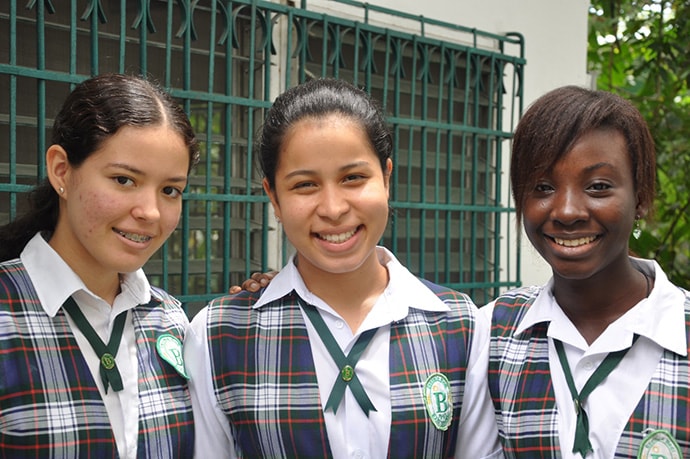
Students in the Badi School, Panama. Mona Foundation partnered with Badi School in 2000, lending support as the school increased the number of grades and classrooms, built a common room, a library, and technological and scientific labs, and developed its arts and character-building programs. Today, Badi School serves over 400 students from 1st grade through 12th grade, 57% of whom are girls. Photo: Mona Foundation
Sustainable Development Goals (SDGs) provide a shared blueprint to achieve a better and sustainable future for all. Education sits at the centre of this 2030 Agenda as a primary driver of progress across all 17 SDGs and as the bedrock of just, inclusive and peaceful societies.[1]
Since 1999, Mona Foundation has partnered with grassroots organizations around the world to address the root causes of poverty and effect systems change through the twin strategies of universal education and gender equality.
Over the past 25 years, working in partnership with 41 grassroots organizations in 23 countries, Mona has provided access to education for over 4.2 million students. This work is driving progress on gender equality, breaking the cycle of poverty, and contributing to sustainable change in the overall well-being of communities across four continents. It is also yielding valuable insights on a new model of education that promotes the social good. Across our partners’ varied experience, we are learning that:
- Education is key to raising change agents who uplift themselves, their families, and their communities. In our experience, sustainable development is only possible when initiatives go beyond concerns with economic prosperity to address a population’s overall well-being – physically, materially, socially, and spiritually. No matter what social issue we want to combat, education is the root of the solution.
- To be transformative, education itself must be transformed to integrate character development and social action — teaching lessons of equality, justice, integrity, care, and service — alongside academics and the arts. Time and again we have seen that when education takes such a wholistic approach, developing the full range of students’ academic, artistic, social, and moral capabilities, it raises global citizens with a twofold purpose: to realize their own full potential and to contribute to the betterment of their communities.
- Educating girls multiplies impact and promotes systems change. As girls are educated and empowered to contribute to the social and economic development of their communities, the value of education and gender equality becomes increasingly visible and outdated social norms (such as child marriage) begin to change.
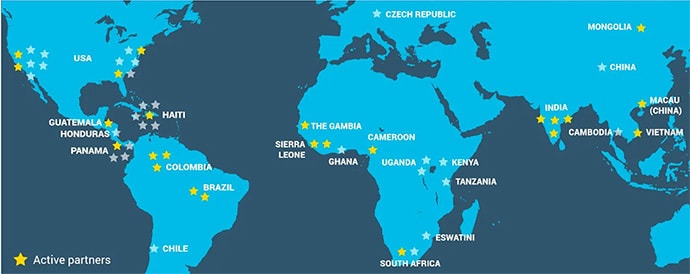
25-Year map of Mona Foundation’s partnerships. Graphic courtesy of Mona Foundation.
Experience has taught us that the ways in which grassroots organizations implement these indispensable principles varies in scope and degree depending on their country’s history and cultural context, diversity of needs and perspectives, and availability of resources. But like the colors of a rainbow, they all diffuse light albeit with different hues.
At this tumultuous period in our history, many leading organizations and governments are realizing that education must be transformed, but they lack the real-world examples of learning to help shape new models of education. In “Renewing Education to Shape the Future” UNESCO writes:
Education and learning systems are at a critical juncture. The climate crisis, the pervasive rise of Artificial Intelligence, growing inequality and societal divisions compel us to rethink the role of education in shaping shared futures…. It has great potential to help shape more just, inclusive and sustainable futures by rebalancing our relationships with each other, the living planet and technology. Yet, to do so, education itself must be transformed.
Past GlobalWA blogs have described the experience of two Mona partners, including MAIA Impact School in Guatemala, and Barli Development Institute for Rural Women in Madhya Pradesh, India. Two more examples are shared below to provide additional examples of what transformative education looks like in practice.
BADI SCHOOL, PANAMA
The town of San Miguelito on the outskirts of Panama City, Panama used to be known for its unsafe and sometimes violent living conditions and a 70% teen pregnancy rate. But this was before Rosa Beatriz Torrez, known affectionately as Loty, gathered a small group of young children, including her own, in the carport of her trailer park in 1993 with the purpose of giving them an enriching educational foundation. There were no schools nearby.
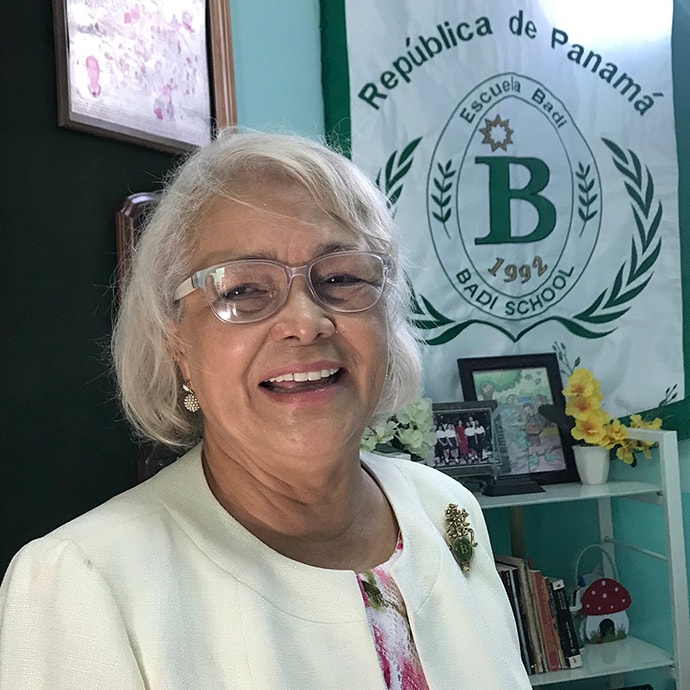
Rosa Beatriz “Loty” Torrez. Photo: Mona Foundation
From this humble beginning, Loty and her husband Oscar, a brilliant engineer, worked tirelessly to build the momentum for the flourishing institution that exists today, known as Badi School. Mona Foundation partnered with Badi School in 2000, lending support as the school increased the number of grades and classrooms, built a common room, a library, and technological and scientific labs, and developed its arts and character-building programs. Today, Badi School serves over 400 students from 1st grade through 12th grade, 57% of whom are girls. The school is widely acknowledged as one of the best in South and Central America, and is recognized for excellence in its academics, arts, technology, and moral leadership programs.
The school has also completely transformed the San Miguelito area, engaging and uplifting its residents and serving as a focal point of social and economic development. For example, to address the high rate of teen pregnancies, Badi developed and integrated an inclusive Moral Education program into its curriculum. It also encouraged teens, especially girls, to join its Arts program to express themselves and discover their hidden talents. Within a few years, the school reported zero incidents of teen pregnancy. This was such a significant achievement that Panama’s Ministry of Education took note and printed Badi’s moral education program in the national newspaper so others could implement it.
“The kids that come from these difficult areas, the way they look at life has really changed,” Badi School’s administrator said in a Mona interview. “They know the situation they have back home, they understand their parents. Now they are educating their parents, and parents are embracing these new values and virtues of their kids.” As the impact of the school’s presence deepened its roots through the community’s generations over time, the upliftment of the local population accelerated.
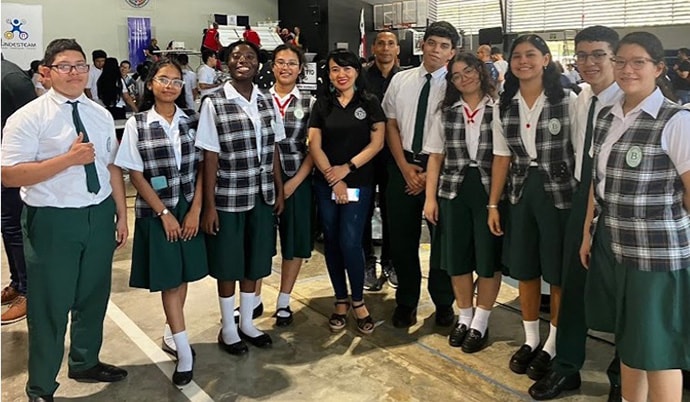
Badi Students at Science Fair, 2024. Photo: Mona Foundation
In recent years, the Ministry of Education took the significant step of adopting Badi’s Moral Education curriculum, the key lever of the school’s outstanding results, as an option to the country’s standard course on religion – implementing it in 3,400 schools and reaching 950,000 students. The Badi School considers this societal impact to be its most significant contribution.
STUDY HALL EDUCATIONAL FOUNDATION, INDIA
Study Hall Educational Foundation (SHEF) in Lucknow, Uttar Pradesh, a Mona partner since 2008, operates an impressive portfolio of initiatives that aim to educate and empower underprivileged children, especially girls, to overcome systemic oppression and become active democratic citizens.
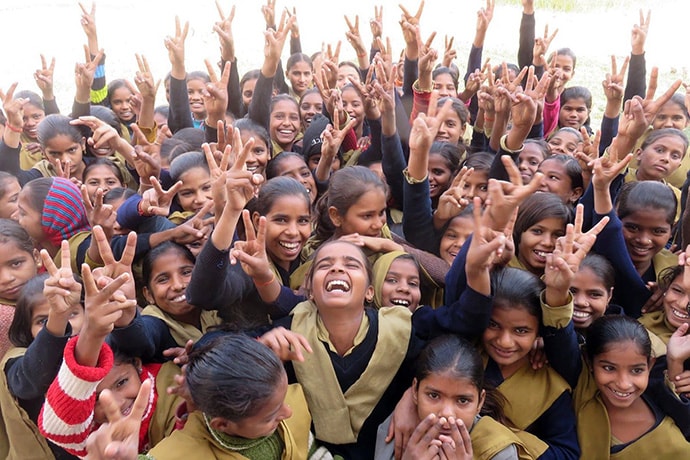
Girls of the SHEF Aaronhini program. Photo: Mona Foundation
Grounded in SHEF’s critical feminist-based pedagogy, its Aarohini initiative provides curricula, teacher training, and ongoing support to raise student and community awareness of oppressive social norms (such as child marriage and domestic violence) and empowers them to stand for equality and justice. Its programs educate girls to see themselves as equal persons deserving of respect with the right and agency to voice their protest. It also educates boys to actively champion gender justice at home and in their communities. Mona Foundation is proud to be Aarohini’s primary supporter.
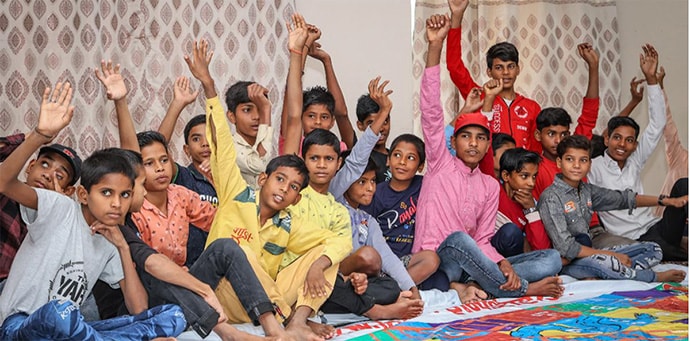
SHEF Boys Camp. Photo: Mona Foundation
Last year, the Aarohini team selected 86 boys from 43 Upper Primary Schools (UPS) in the city of Sitapur to become champions of gender justice in their communities. These boys participated in SHEF’s first-ever residential boys’ camp to reflect on the different gendered experiences in their community, what they can do to address these issues, and how to challenge oppressive societal norms. The Aarohini team is committed to supporting these boys through their higher education and has been conducting Critical Dialogue sessions at their schools and regularly visiting them to check on their progress and well-being. A follow-up camp was held earlier this year. The schools also now see these boys as agents of change and includes them in parent and community meetings. The impact has been significant with story after story, like the following, of boys making a real difference.
Arjun resides in Bhagwatipur village with his family, including his parents and younger sister. From a young age, he witnessed his father abusing his mother both mentally and physically, a distressing occurrence that unfortunately became routine for him. Unaware of the severe consequences, Arjun and his sister endured the situation passively, adversely affecting both their mental health and education. Because he was a boy, Arjun was able to continue his education, while his sister remained at home assisting their mother with household chores. Positive change occurred when Arjun began regularly attending Critical Dialogue Sessions. Empowered by these sessions, he confronted his father about the abuse and began assisting his mother and sister in household responsibilities. Arjun fought for his sister’s education, successfully enrolling her in school. Currently in the 9th grade, Arjun actively advocates for education in his village and inspires other children to pursue schooling.
To date, the Aarohini program has trained almost 4,000 government schoolteachers in over 1,000 schools in SHEF’s pedagogy, serving the most vulnerable populations of rural children in Uttar Pradesh and Rajasthan. The program has been so successful that the Uttar Pradesh Ministry of Education recently adopted the Aarohini program for use in all 250,000 public schools in the state, including 746 residential schools serving 100,000 low-income girls in grades 6-8.
——–
To learn more about Mona Foundation’s growing experience with transformative education, join us at Seattle’s Benaroya Hall on October 5th for the premiere of its documentary “Light and Air” (register here). The short film tells the representative story of a few students whose lives were forever changed and who in turn are uplifting all around them. The screening will be followed by a Q&A and a panel discussion with distinguished guests.

[1] Catalyst 2030, Pathways to Transforming Education